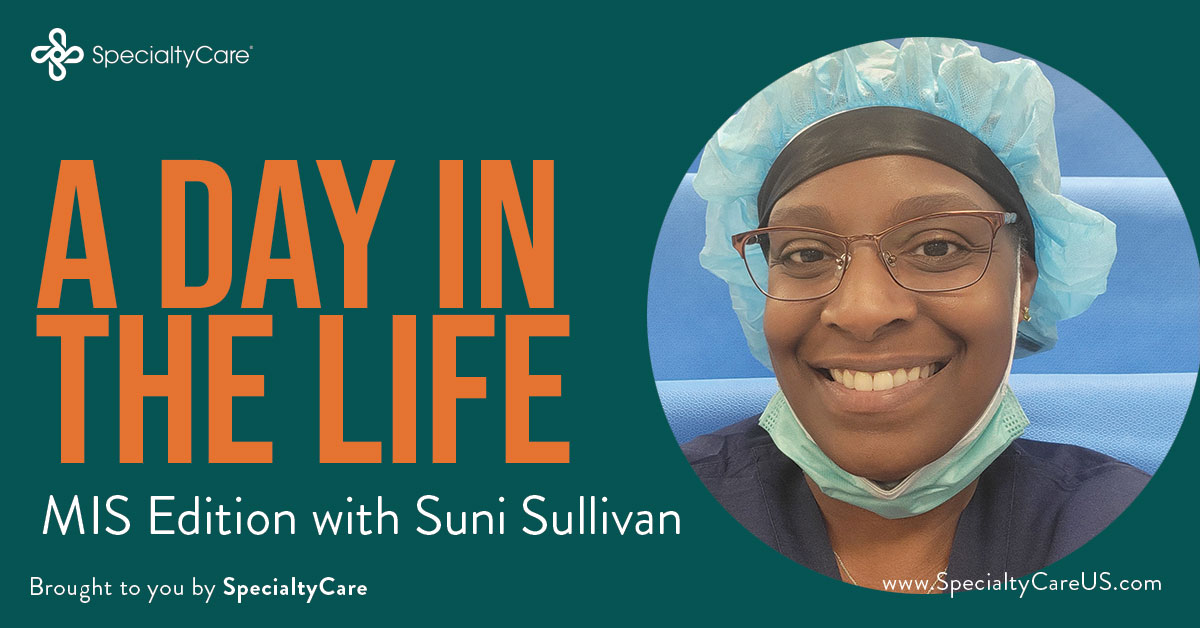Throughout Minimally Invasive Surgery (MIS) Week, we’re highlighting some of our amazing SpecialtyCare staff. These individuals make a significant impact every day, and we’re excited to acknowledge their notable contributions to MIS.
How long have you been a minimally invasive clinical specialist and which team are you currently on?
I started with AES as a Corporate Traveler for the MISS service line and, when SpecialtyCare acquired AES in 2010, I stayed on board with the same title. I traveled for SpecialtyCare nationwide for eight years before I decided to stop traveling and work permanently as part of the South Florida team in 2018.
What led you to become interested in MIS and can you describe the path you took to become a minimally invasive clinical specialist?
I didn’t know anything about MIS, AES, or SpecialtyCare. I’m a surgical tech by training. I was recommended for this job by a headhunter that was looking for applicants for a healthcare travel agency even though I was applying for traveling surgical tech jobs. The headhunter sent my information to AES, and the rest is history.
What are the benefits of a career in MIS?
One benefit of an MIS career is that I’m able to work in the OR in a clinical capacity while not having to worry about working on-call hours, weekends, or holidays. I’m also still able to apply my operating room skill set to assist other hospital staff in the OR.
What is a day in the life of a minimally invasive clinical specialist like?
This is a difficult question to answer. For the most part, the cases are the same but every day is different. It’s an early start of arriving onsite around 6:30 am. I check the OR schedule for any add-on cases and canceled cases to start the day. Then, I head to SPD to check instrumentation for the day’s cases. I set up the video in the rooms and pull trays in the OR while the remaining staff gets their day going.
Then, I head back to see if any instrumentation needs to be cleaned and turned over for later cases. When the patient arrives at the OR asleep, positioned, prepped and draped, I plug in the camera, light cord, and insufflation. I ensure that the video is working properly and that pictures are being captured. I also run for any items that might be needed during the procedure. After the procedure, I process all instrumentation that SpecialtyCare is contracted to service. I’m always available to the OR staff to help with any technical issues that might pop up during the procedure.
What communication advice would you give for working successfully in a team dynamic?
The advice I can give is that it helps when the information isn’t given at the last minute. I do my best to be 100% transparent when communicating with members of my team.
What was a surprise to you about the career when you first started?
When I first started this career, I was surprised that it was such an easy job for a control freak like me. I was expecting it to be more difficult, but I’m happy that it wasn’t.
What has been a memorable moment or story you’d like to share from your career?
There are so many stories to share. However, one that sticks out to me was working at Christiana in Delaware while I was traveling and things started to quickly go downhill during a Lap Chole with a difficult surgeon. The surgical tech was a new graduate on her own during the case, and she was very nervous. I stayed in the room and helped her through every step of the entire case even as it became difficult. Three hours later, the surgeon and tech were extremely grateful for my past OR experience and calm demeanor in the room.
